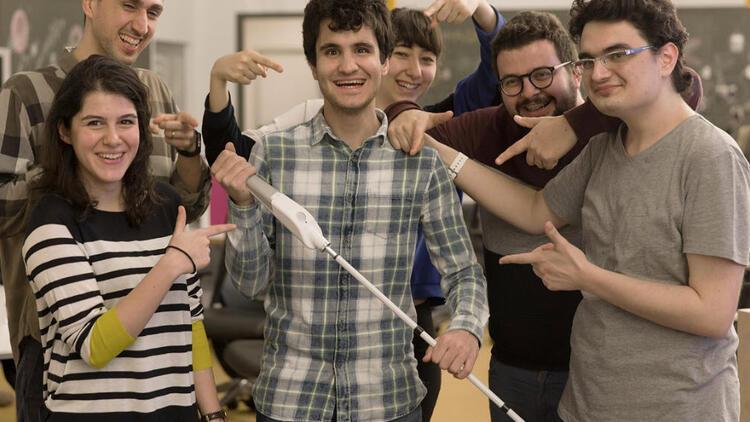
Shaken by an accident in New York City whose scars on his head are visible even now, a blind man from Turkey turned the collision into an opportunity to help millions.
Navigating the streets of the Big Apple while pulling a suitcase and holding both a walking stick and smartphone to navigate - yet with only two hands - was too much to handle, recounted Kürşat Ceylan.
After hitting a lamppost, “reflexively my hand went to my face, and oh, it was really bloody,” he told an audience in Berlin last year.
But that head cut planted the seed for an invention to help the 280 million visually impaired people around the globe: WeWalk, possibly the world’s first smart cane.
Listed as one of the best inventions of 2019 by Time magazine, WeWalk allows visually impaired people to walk safer using cutting-edge technology.
“Visually impaired people have been using for years a white cane, which is basically a stick,” Ceylan, the 33-year-old co-founder of WeWalk, told Anadolu Agency in Maslak, an Istanbul business hub.
“We can detect a lot of obstacles ahead [with a plain cane] especially on ground level like steps or holes,” he said. “But we can’t detect obstacles at the level of the chest or head like trees and signs.”
But WeWalk changes all that by alerting blind people when there is an obstacle ahead by making a sound or vibrating.
The device is a lightweight 252 grams - or just over half a pound - and measures about 30 cm (11.9 inches). It features a touchpad and is its interface is equipped with several languages, including English, Turkish, Portuguese, Arabic, and very soon Spanish and French.
Integration with Istanbul buses
“Technology is developing fast, and now we transferred this technology into white canes,” said Ceylan. “So, when blind people are walking, they can get navigation to get them wherever they want to go or can learn what bus is coming around to the bus stop where they’re waiting.”
The smart cane is already integrated with public transportation service in the 15-million strong Turkish metropolis of Istanbul as well as with Google maps and voice assistant.
The electronic cane retails for about 1,990 Turkish Lira ($346), and in the future is set to be integrated with ride-sharing apps and smart cities.
Visually impaired people from some two dozen countries - including the United States, Japan, South Korea and Brazil -- have already bought the new smart canes, said Ceylan.
“In many countries, state or city governments are providing these technologies for visually impaired people, and we expect the start of something similar in Turkey,” he added.
The feedback from users has also been very positive, according to Ceylan.
The WeWalk team recently got an email from an Irish teacher who lost his sight a few years ago, saying that with the help of the smart cane, he was able to resume his social life.
Products to come
Nor is WeWalk the team’s only product.
Ceylan and his colleagues have been producing technologies for visually impaired people for a decade now.
So far, they have produced an indoor navigation system and audio description system for movies to help the visually impaired.
On being honored by Time magazine, Ceylan said: “This makes us very pleased as technology producers from Turkey.”
“We developed this technology solely in Turkey, and we made the cane in Turkey with the support of Vestel,” a Turkish appliance maker popular in both Turkey and Europe, he added.
“It pleases us greatly to be an inspiration to the world as a success story from Turkey,” he said with pride.
Now WeWalk’s team is working on a project that will notify visually impaired people of nearby shops, cafes and restaurants as they stroll down the street.